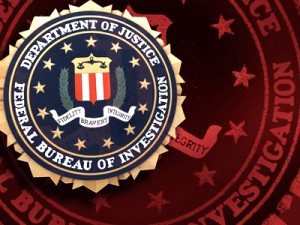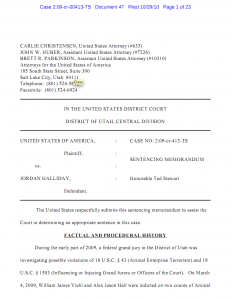 I recently wrote about Jordan Halliday, an animal rights activist who was jailed for refusing to name names before a federal grand jury investigating the release of mink from fur farms. Prosecutors urged a harsh prison sentence because Halliday has publicly vowed to resist the political witch hunt.
I recently wrote about Jordan Halliday, an animal rights activist who was jailed for refusing to name names before a federal grand jury investigating the release of mink from fur farms. Prosecutors urged a harsh prison sentence because Halliday has publicly vowed to resist the political witch hunt.
In the sentencing memorandum, they said that, while awaiting sentencing, Halliday continued to protest, continued to associate with animal rights activists, and continued to urge activists to support him.
And then prosecutors described to the judge what they said is an even more troubling association.
“Of More Serious Concern”
“Of more serious concern is the fact uncovered by the FBI” that Jordan Halliday was mentioned in a photo caption on this website, they said.
The FBI had given prosecutors an article I wrote titled, “BREAKING: FBI Raids Activist House in Utah, Connected to Iowa ALF Investigation.” I covered this story as it happened, and scooped local press. I was able to do this because, as I noted in the article, “I just got off the phone with multiple housemates who were there witnessing the raid, and who were able to read the warrant.” The housemates called me because I have been reporting on the FBI’s attacks on animal rights and environmental activists since 2001. I later updated the blog post with a photo from the scene that credited Jordan Halliday.
To me, this was Journalism 101 — work fast, then flesh out details and add a photo. To the FBI, this quick work was the evidence of a network of extremists. Prosecutors state in the sentencing memo: “The search warrant was sealed, as is typical, with no warning or public knowledge ahead of the time of service. Nonetheless, photograph taken contemporaneous with the execution of the search warrant service has been attributed to the defendant on the animal rights extremist website” GreenIsTheNewRed.com.
Guilty By Association
It is not surprising to see a government sentencing memo try to connect a defendant to “extremists.” I’ve covered this in many, many prosecutions. The intention is to use guilt by association to secure additional prison time. For example, prosecutors will say that Joe Defendant is friends with drug dealers, or that Jane Defendant’s family are in a gang.
In this case, the government labels journalism as extremism.
Prosecutors say that since my article mentioned Halliday in a photo caption, it means he placed himself “above the law” and violated an order to have “No association with animal group[s] A.L.F., E.L.F., Vegan Straight Edge (VSE).†[The ALF and ELF are the underground Animal Liberation Front and Earth Liberation Front. “Vegan Straight Edge” is a punk lifestyle, not a terrorist group, and I’m having a hard time even typing this explanation without being reminded by these lyrics.]
Packed into that short accusation are two dangerous unstated assumptions:
- Anyone who takes a photo of law enforcement is associated with those being targeted. Keep in mind that this raid led to no arrests. Yet the government says that merely possessing a photo of it implies criminal association, and is acting “above the law.”
- Anyone who writes about what the government is doing to animal rights activists is an “animal rights extremist” by extension. This is the most dangerous message being sent by the government. My writing and commentary on civil liberties issues has been featured by NPR, the Los Angeles Times, Mother Jones, and many other of the top media outlets in the country. I have lectured at nearly 100 universities and associations, including Georgetown Law School, Yale Law School, and the House of Democracy and Human Rights in Berlin. My book was awarded a Kirkus Star for “remarkable merit,” and has been praised by Publishers Weekly, Utne, the Bill of Rights Defense Committee, and many others. I say all this hoping to make clear that if my journalism is being labeled “extremist,” if my entire body of professional work can be reduced to extremism because I ask questions about what the government and corporations are doing, then everyone is at risk.
Chilling Free Speech
If there has been one theme running through all of my work, through every blog post and book chapter and speaking event, it is this: fear. Corporations and politicians are using post-9/11 fears of terrorism to push their political agenda. Fear is being manufactured and manipulated by people in power in order to make people think twice about using their rights.
This chilling effect on First Amendment activity is at the core of lawsuit by the Center for Constitutional Rights challenging the Animal Enterprise Terrorism Act. The vague and overly broad language of the law, and the sweeping attempts of prosecutors to utilize it (such as this grand jury investigation), is unconstitutional not because it has expressly prohibited First Amendment activity, but because it has chilled it.
This is another representation of that constitutional threat, in two ways:
It makes me feel that using my First Amendment rights puts me at risk. Describing journalism as “extremist” in the context of a terrorism investigation is, to put it mildly, unsettling. This isn’t the first time I have learned of surveillance like this. I have previously written about how my writing and speeches have been listed in Counter-Terrorism Unit briefing documents.
More importantly, it makes me feel that using my First Amendment rights puts my sources at risk. When I saw that my work was being used by the FBI and prosecutors against Halliday, it made me sick to my stomach. It’s one thing to see my name in terrorism files, it’s another to see my work being used by prosecutors to punish people I have written about. An old muckraking motto is “comfort the afflicted, afflict the comfortable.” To have my work afflict people who already have the full weight of the U.S. government pressing down upon them goes against everything I believe about this craft.
A Pattern on Behavior
You might be asking: Was the government really trying to send these messages? Or was this a case of bad FBI intelligence and prosecutors who don’t “get it”? (To steal a line from The Daily Show, “Are they evil, or stupid?”)
I don’t know the answer to that question. But I know government officials have done this before. When I visited Daniel McGowan in the Communications Management Unit, prison officials did not threaten me. They did not expressly prohibit me from writing about the experimental prison units. Instead, they told McGowan that if I wrote about the visit he would be punished for my words.
I also know that prosecutors said Jordan Halliday needs to be punished for his “stardom,” so “defendant’s supporters are not emboldened to follow the defendant’s contemptuous ways.” Through these and many other examples, it’s clear that the government is openly trying to send a message.
And so, as I edit this, about to hit “publish,” I keep hesitating. Will writing about this amplify that message of fear? Everything I do depends on the trust I have built with countless activists and their friends and families. What if this makes people afraid to be mentioned on this website?
The mere fact that I have to ask myself those questions is a testament to how much we have lost in the name of fighting “terrorism.”
This pattern of conduct by the FBI and federal prosecutors is nothing less than an attack on the First Amendment, and an attack on journalism. It is an attempt to foster distrust between author and source, and it is an attempt to shake the confidence that one can report freely and without retribution, both of which are essential to any meaningful expression of journalism in a democracy.
